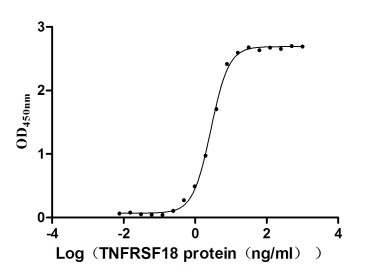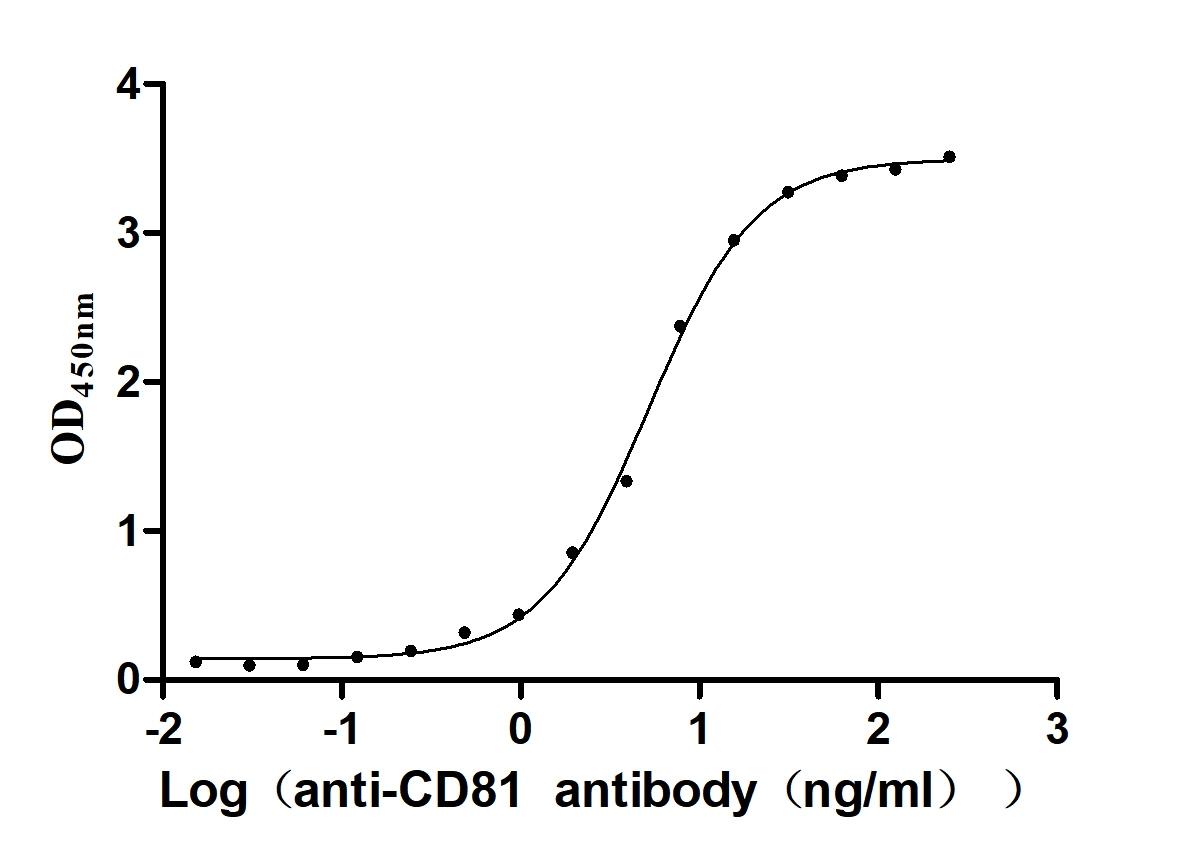Recombinant Human Centrosomal protein of 68 kDa (CEP68)
-
货号:CSB-YP765741HU
-
规格:
-
来源:Yeast
-
其他:
-
货号:CSB-EP765741HU
-
规格:
-
来源:E.coli
-
其他:
-
货号:CSB-EP765741HU-B
-
规格:
-
来源:E.coli
-
共轭:Avi-tag Biotinylated
E. coli biotin ligase (BirA) is highly specific in covalently attaching biotin to the 15 amino acid AviTag peptide. This recombinant protein was biotinylated in vivo by AviTag-BirA technology, which method is BriA catalyzes amide linkage between the biotin and the specific lysine of the AviTag.
-
其他:
-
货号:CSB-BP765741HU
-
规格:
-
来源:Baculovirus
-
其他:
-
货号:CSB-MP765741HU
-
规格:
-
来源:Mammalian cell
-
其他:
产品详情
-
纯度:>85% (SDS-PAGE)
-
基因名:
-
Uniprot No.:
-
别名:Centrosomal protein 68kDa; Centrosomal protein of 68 kDa; Cep68; CEP68_HUMAN; FLJ25920; FLJ36750; KIAA0582
-
种属:Homo sapiens (Human)
-
蛋白长度:full length protein
-
表达区域:1-757
-
氨基酸序列MALGEEKAEA EASEDTKAQS YGRGSCRERE LDIPGPMSGE QPPRLEAEGG LISPVWGAEG IPAPTCWIGT DPGGPSRAHQ PQASDANREP VAERSEPALS GLPPATMGSG DLLLSGESQV EKTKLSSSEE FPQTLSLPRT TTICSGHDAD TEDDPSLADL PQALDLSQQP HSSGLSCLSQ WKSVLSPGSA AQPSSCSISA SSTGSSLQGH QERAEPRGGS LAKVSSSLEP VVPQEPSSVV GLGPRPQWSP QPVFSGGDAS GLGRRRLSFQ AEYWACVLPD SLPPSPDRHS PLWNPNKEYE DLLDYTYPLR PGPQLPKHLD SRVPADPVLQ DSGVDLDSFS VSPASTLKSP TNVSPNCPPA EATALPFSGP REPSLKQWPS RVPQKQGGMG LASWSQLAST PRAPGSRDAR WERREPALRG AKDRLTIGKH LDMGSPQLRT RDRGWPSPRP EREKRTSQSA RRPTCTESRW KSEEEVESDD EYLALPARLT QVSSLVSYLG SISTLVTLPT GDIKGQSPLE VSDSDGPASF PSSSSQSQLP PGAALQGSGD PEGQNPCFLR SFVRAHDSAG EGSLGSSQAL GVSSGLLKTR PSLPARLDRW PFSDPDVEGQ LPRKGGEQGK ESLVQCVKTF CCQLEELICW LYNVADVTDH GTAARSNLTS LKSSLQLYRQ FKKDIDEHQS LTESVLQKGE ILLQCLLENT PVLEDVLGRI AKQSGELESH ADRLYDSILA SLDMLAGCTL IPDKKPMAAM EHPCEGV
-
蛋白标签:Tag type will be determined during the manufacturing process.
The tag type will be determined during production process. If you have specified tag type, please tell us and we will develop the specified tag preferentially. -
产品提供形式:Lyophilized powder
Note: We will preferentially ship the format that we have in stock, however, if you have any special requirement for the format, please remark your requirement when placing the order, we will prepare according to your demand. -
复溶:We recommend that this vial be briefly centrifuged prior to opening to bring the contents to the bottom. Please reconstitute protein in deionized sterile water to a concentration of 0.1-1.0 mg/mL.We recommend to add 5-50% of glycerol (final concentration) and aliquot for long-term storage at -20℃/-80℃. Our default final concentration of glycerol is 50%. Customers could use it as reference.
-
储存条件:Store at -20°C/-80°C upon receipt, aliquoting is necessary for mutiple use. Avoid repeated freeze-thaw cycles.
-
保质期:The shelf life is related to many factors, storage state, buffer ingredients, storage temperature and the stability of the protein itself.
Generally, the shelf life of liquid form is 6 months at -20°C/-80°C. The shelf life of lyophilized form is 12 months at -20°C/-80°C. -
货期:Delivery time may differ from different purchasing way or location, please kindly consult your local distributors for specific delivery time.Note: All of our proteins are default shipped with normal blue ice packs, if you request to ship with dry ice, please communicate with us in advance and extra fees will be charged.
-
注意事项:Repeated freezing and thawing is not recommended. Store working aliquots at 4°C for up to one week.
-
Datasheet :Please contact us to get it.
相关产品
靶点详情
-
功能:Involved in maintenance of centrosome cohesion, probably as part of a linker structure which prevents centrosome splitting. Required for localization of CDK5RAP2 to the centrosome during interphase.
-
基因功能参考文献:
- CEP68 is important in forming rootletin filaments that branch off centrioles and to modulate the thickness of rootletin fibers. PMID: 29463719
- It has been proposed that the archetypal linker protein Rootletin maintains centrosome cohesion in part through inhibition of VHL-mediated Cep68 degradation. PMID: 28089774
- The Cep68 protein level needs to be fine-tuned in order to ensure that its direct interactors, such as the microcephaly protein Cep215 and PCNT, function properly. PMID: 28578000
- Cep68 degradation allows Cep215 removal from peripheral pericentriolar material (PCM) preventing centriole separation following disengagement, PCNT cleavage mediates Cep215 removal from core of the PCM to inhibit centriole disengagement and duplication PMID: 25503564
- C-terminal 300-400 amino acids of Cep68 are necessary to localize Cep68 to interphase centrosomes while C-terminal 400-500 amino acids might regulate Cep68 dissociation from centrosomes at mitotic onset. PMID: 25704143
- CEP68 gene variants may play an important role in MNSAID-UA susceptibility and, despite the different regulatory mechanisms involved depending on the specific affected organ, in the development of hypersensitivity reactions to NSAIDs. PMID: 24618698
- Findings imply that CEP68 could be a susceptible gene for aspirin intolerance in asthmatics. PMID: 21072201
- our study is the first to identify and validate Endofin, DCBLD2, and KIAA0582 as part of a complex EGF phosphotyrosine signaling network PMID: 17570516
- data suggest that Cep68 cooperates with rootletin and C-Nap1 in centrosome cohesion. PMID: 18042621
显示更多
收起更多
-
亚细胞定位:Cytoplasm, cytoskeleton, microtubule organizing center, centrosome.
-
数据库链接:
HGNC: 29076
OMIM: 616889
KEGG: hsa:23177
STRING: 9606.ENSP00000367229
UniGene: Hs.709257
Most popular with customers
-
Recombinant Human Tumor necrosis factor receptor superfamily member 18 (TNFRSF18), partial (Active)
Express system: Mammalian cell
Species: Homo sapiens (Human)
-
Recombinant Human Pro-neuregulin-1, membrane-bound isoform (NRG1), partial (Active)
Express system: Mammalian cell
Species: Homo sapiens (Human)
-
Recombinant Human Tumor necrosis factor ligand superfamily member 8 (TNFSF8), partial (Active)
Express system: Mammalian cell
Species: Homo sapiens (Human)
-
Recombinant Human CD81 antigen (CD81), partial (Active)
Express system: Mammalian cell
Species: Homo sapiens (Human)



-AC1.jpg)












